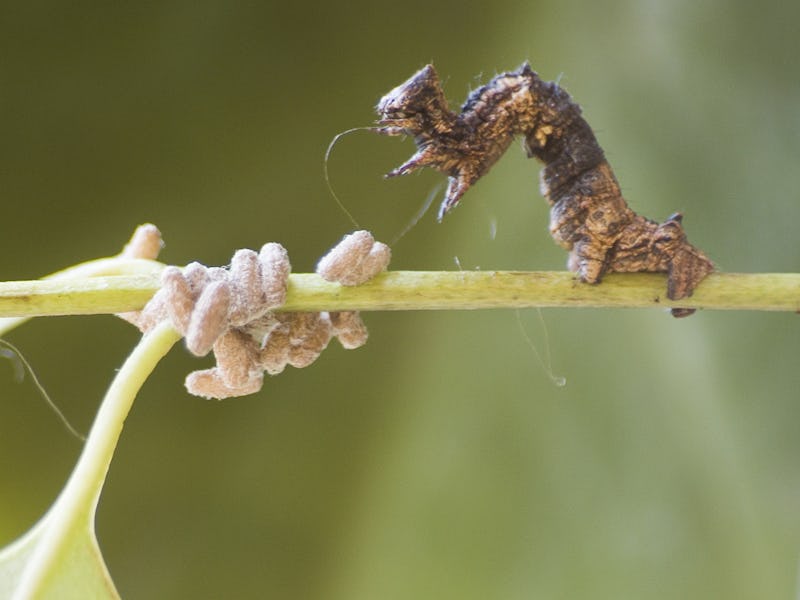Neuro-Parasites Exerting Mind Control Reveal Nature's 'Imperius Curse'
This is far more horrifying than anything you'd see in the Harry Potter universe.

In the ‘Harry Potter’ universe, one of the worst things you can do is cast the Imperius Curse. To use this Unforgivable Curse is to render someone utterly, completely under your control. That power might seem like it belongs strictly in the fantasy realm, but in the metal world of insects and fungi, it’s wielded every day. As a Frontiers in Psychology review published Tuesday shows, neuro-parasites are experts at mind control that could deepen our understanding about the nature of decision making and free will.
It’s a mysterious, eerie ability, especially when it leads unwitting victims to act against their will and sometimes even commit suicide. In their paper, the team of scientists from Ben-Gurion University of the Negev admit that they still don’t know how parasites take control of a host’s nervous system in such a complete way, explaining that “the neuronal underpinnings responsible for behavioral spontaneity in insects remain elusive.” What’s not elusive is actual evidence of this behavior, which humans have observed with horror for millennia.
“Parasites have evolved, through years of co-evolution with their host, a significant ‘understanding’ of their hosts’ neuro-chemical systems,” co-author and neurobiologist Frederic Libersat, Ph.D., announced in a statement released Tuesday. “Exploring these highly specific mechanisms could reveal more about neural control of animal behavior.”
An array of parasitic behavior. In image A a parasitic worm emerges from its drowning cricket host.
Forced Suicide
Take, for example, the suicidal behavior of infected crickets. If a cricket is infected with a parasitic hairworm, it’s forced to seek out water, which inevitably leads to death by drowning. This allows the hairworm to get into an aquatic environment, where it can reproduce.
Ants are also sometimes forced to their deaths by a parasitic fungus of the genus Cordyceps, which shoots out spores that invade the ant’s body. From there, the fungus spores grow from within the ant, consuming it from the inside yet keeping its vital organs alive. It then creates “certain, yet unidentified chemicals” that cause the ant to climb a tree, bite onto a leaf, and from that bite release spore-filled capsules that explode as they fall — spreading more infectious fungi down to the world below. When the fungus is ready to release the spores, it “eventually feeds on the ant’s brain and thus kills it.”
Ants biting the underside of leaves as a result of infection by * O. unilateralis*.
Bodyguard Manipulation
This type of parasitic interaction is used primarily to force unsuspecting victims into becoming zombie nannies. For example, parasitic wasps will inject their eggs into a caterpillar with a sting (don’t feel too bad for caterpillars though, because they use also use pheromones to turn ants into their unwitting slaves). Once in the caterpillar’s blood, the eggs hatch into larvae that feast on the blood — and, when the time is right, up to 80 of those suckers explode from the caterpillar in a process that can only be described as hell on Earth.
That’s not it for the caterpillar though: That poor sap has to stick around, controlled by one or two remaining larvae that force it to act super freaky towards predators in an effort to protect the newly formed cocoons. If that sounds bad, parasitic flies inject their eggs into ants and when the eggs hatch, the ant’s head bursts from its body and adult flies come crawling out. So, there’s always something worse.
Decision Hijacking
The scientists behind this review are en route to understanding the mechanics of the parasitic process. In their lab, they’re “exploring a unique and naturally-occurring phenomenon in which one insect uses neurotoxins to apparently ‘hijack’ the decision-making ability of another.” This phenomenon is a result of millions of years of co-evolution — and one that humans are, for the most part, left out of. While some scientists suggest that Toxoplasma gondii infections can alter human behavior, the fact that we’re no longer regularly meals for big cats is predominantly what makes us unsuitable intermediate hosts.
There’s a lot to be thankful for regarding not being eaten by leopards, but avoiding getting your brain taken over by a parasite has to be near the top of the list.